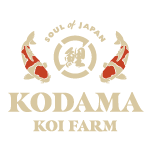Kohaku
It has been said that koi keeping begins and ends with Kohaku. The history of Kohaku koi fish dates back to the 19th century in Japan when the first red and white carp were discovered and bred selectively to enhance their vivid coloration and distinctive patterns.
The origins of Kohaku trace back to the Niigata region, where dedicated breeders perfected this iconic variety. In any variety that contains red patterns, it's evaluated on an examination of its Kohaku pattern. Kohaku, Taisho Sanke, and Showa are the most popular three varieties of koi and are referred to as Gosanke.
How to Judge Kohaku
The white background in any variety is called Shiroji. While we call it the background, you should think of white as a color that is as important as other colors such as red or black, and not just an insignificant background. The Shiroji should always be snow-white. In addition to this Shiroji, Fukurin will bring the beauty of this koi to an even higher level. Furkurin is the koi's skin, and it creates a beautiful net pattern around the scales in some koi when they are mature.
In Kohaku, the Hi (red pattern) must end in the tail section, and that line between Hi and Shiroji is the Odome. The red pattern on the tail section is called the Odome Hi and its appearance can drastically change the value of the koi. In Kohaku, the thicker the Hi, the better. However, an extreme red does not mean the Hi is thicker, and is not preferable. The Hi of koi will become thicker as it grows. The coloration of the Hi depends on how much pigment (carotene) is absorbed from the koi food. Therefor, we must provide food that contains carotene to get beautiful and thick Hi color. It is also desirable to have the Hi-moyo wrap down below the lateral line of the koi, which we call Maki.
The head of a koi is equivalent to the face of a human. Hi on its head is called Toh Hi. Toh Hi is very important because it expresses the character of the koi. Ideally the amount of Toh Hi should balance the Odome Hi. Koi that have this balance appear beautiful even to those who are uneducated about koi, although they do not know why. The eye is also important for koi. The coloration of the eye will really influence how we evaluate the koi.
Origin of Kohaku Koi
The most representative koi variety out of 80+ varieties is the Kohaku that has a red pattern on a white body.
200 years ago, the Koi with red color on the white skin already existed, but they were called “Sarasa 更紗“ at the time. This name was made after the Japanese traditional craft textile “Sarasa”. Sarasa is the traditional textile that various colors are dyed on cotton cloth. After the Sarasa Koi appeared 200 years ago, the quality of Sarasa koi was gradually improved, and she caught many people’s eyes and won a favor. The name “Sarasa” had been remaining for a long time after the exhibition.
Then, after the war, when the country restored peace, Nishikigoi got popular more and more in Japan. Nobody knows why, but the name was spontaneously switched from Sarasa to Kohaku.
Now, Kohaku is one representative variety of Koi fish, and they are loved by people from all over the world. Like dogs and cats, people take the bloodline of Koi very serious, and the name of koi breeder is an important factor as a designer named bag.
Kohaku Patern Types
Kohaku Pattern Types:
The red markings on a Kohaku are categorized into different pattern types, such as:
- Kohaku Nidan (two-step pattern)
- Kohaku Sandan (three-step pattern)
- Kohaku Yondan (four-step pattern)
- Kohaku Inazuma (lightning bolt pattern)
- Tancho (a single, round red spot on the head)
Explore Our Collection of Kohaku Koi! Browse below to find the perfect addition to your pond. If you don't see what you're looking for, contact us, and we'll help you find the right koi. Shop Live Koi Now!
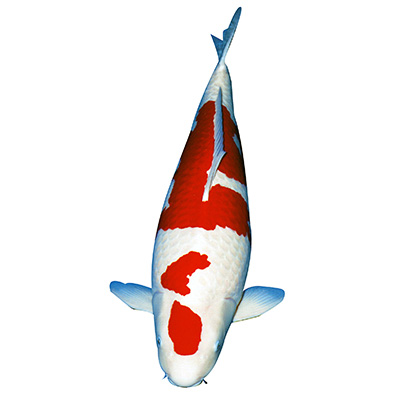
Showing 1–16 of 44 resultsSorted by latest
-

Kohaku – koi #x0307s017-re
Starting bid: $500.00Time left:Login / Register to BidEstimated Value: $1,800.00Breeder(s): Isa Koi FarmSex: MaleBorn in: 2022Size: 18.11 inch / 46 cmVariety: Kohaku, -

Kikusui – koi #x0319a016
Starting bid: $80.00Time left:Login / Register to BidEstimated Value: $300.00Breeder(s): Kanno Koi FarmSex: MaleBorn in: 2023Size: 14.96 inch / 38 cm -
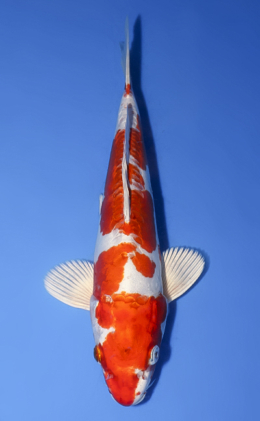
Kikusui – koi #x0319a012
Starting bid: $90.00Time left:Login / Register to BidEstimated Value: $300.00Breeder(s): Kanno Koi FarmSex: MaleBorn in: 2023Size: 10.63 inch / 27 cm -
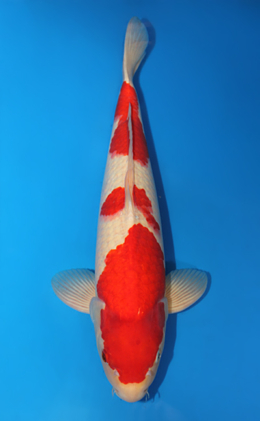
Kohaku – koi #x0306s014-re
Starting bid: $900.00Time left:Login / Register to BidEstimated Value: $3,500.00Breeder(s): Dainichi Koi FarmSex: MaleBorn in: 2022Size: 22.05 inch / 56 cmVariety: Kohaku, -

Kikusui – koi #x0319a007
Starting bid: $80.00Time left:Login / Register to BidEstimated Value: $300.00Breeder(s): Kanno Koi FarmSex: FemaleBorn in: 2023Size: 11.42 inch / 29.5 cm -

Kohaku – koi #x0326a043
Starting bid: $180.00Time left:Login / Register to BidEstimated Value: $600.00Breeder(s): Sakai CompanySex: UnknownBorn in: 2024Size: 6.69 inch / 17 cmVariety: Kohaku, -
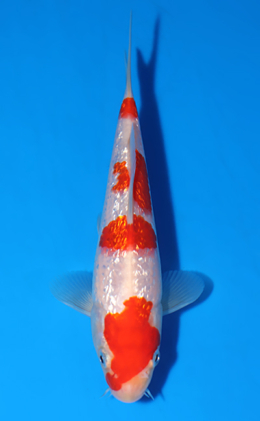
Ginrin Kohaku – koi #x0326a054
Starting bid: $160.00Time left:Login / Register to BidEstimated Value: $500.00Breeder(s): Torazo Urakawa Koi FarmSex: UnknownBorn in: 2024Size: 6.30 inch / 16 cm -

Ginrin Kohaku – koi #x0326a053
Starting bid: $160.00Time left:Login / Register to BidEstimated Value: $500.00Breeder(s): Torazo Urakawa Koi FarmSex: UnknownBorn in: 2024Size: 6.69 inch / 17 cm -

Ginrin Kohaku – koi #x0326a052
Current bid: $160.00Time left:Login / Register to BidHighest Bidder:David D DanielEstimated Value: $500.00Breeder(s): Torazo Urakawa Koi FarmSex: UnknownBorn in: 2024Size: 7.87 inch / 20 cm
Ginrin Kohaku – koi #x0326a051
Current bid: $160.00Time left:Login / Register to BidHighest Bidder:SandiEstimated Value: $500.00Breeder(s): Torazo Urakawa Koi FarmSex: UnknownBorn in: 2024Size: 6.69 inch / 17 cm
Ginrin Kohaku – koi #x0326a050
Starting bid: $160.00Time left:Login / Register to BidEstimated Value: $500.00Breeder(s): Torazo Urakawa Koi FarmSex: UnknownBorn in: 2024Size: 6.30 inch / 16.5 cm
Kohaku – koi #x0326a049
Starting bid: $200.00Time left:Login / Register to BidEstimated Value: $800.00Breeder(s): Torazo Urakawa Koi FarmSex: UnknownBorn in: 2024Size: 7.09 inch / 18 cmVariety: Kohaku,
Kohaku – koi #x0326a048
Starting bid: $180.00Time left:Login / Register to BidEstimated Value: $600.00Breeder(s): Torazo Urakawa Koi FarmSex: UnknownBorn in: 2024Size: 8.27 inch / 21.5 cmVariety: Kohaku,
Kohaku – koi #x0326a047
Starting bid: $180.00Time left:Login / Register to BidEstimated Value: $600.00Breeder(s): Torazo Urakawa Koi FarmSex: UnknownBorn in: 2024Size: 7.48 inch / 19 cmVariety: Kohaku,
Kohaku – koi #x0326a046
Starting bid: $180.00Time left:Login / Register to BidEstimated Value: $600.00Breeder(s): Torazo Urakawa Koi FarmSex: UnknownBorn in: 2024Size: 7.09 inch / 18.5 cmVariety: Kohaku,
Kohaku – koi #x0326a045
Starting bid: $180.00Time left:Login / Register to BidEstimated Value: $600.00Breeder(s): Sakai CompanySex: UnknownBorn in: 2024Size: 5.91 inch / 15 cmVariety: Kohaku,Can't find the koi you're looking for? Click here to use our koi request form
Request the Koi of Your Dreams
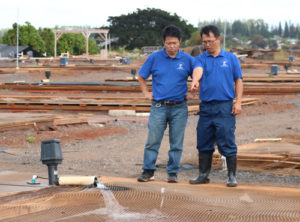
What can we help you find?
Let us know more about what you are searching for and we will look into our inventory to help you find the perfect koi. Tell us a description, variety, size range, and price range you are searching for.
We have a large stock of koi that are not listed on our website and we can also look when we are visiting Niigata, Japan. Complete this form and we will follow up with you directly.
Koi Request Form
